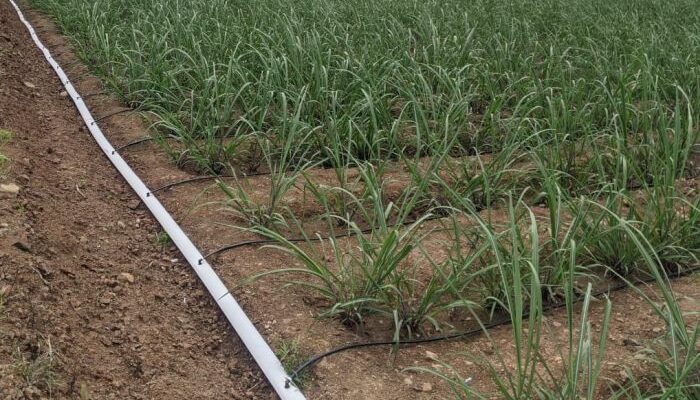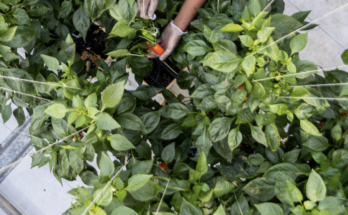India is one of the most vulnerable countries to the physical risks of climate change in Asia. And it is already visible, thanks to erratic and incessant rains, frequent cases of droughts and cyclones, and extended winters. The agriculture sector is sensitive to these changes and new trends in weather patterns. The major fallout is crop loss, which causes huge distress to the economically weaker section of farmers and the rural population dependent on farming activities. Over 86 per cent of farmers in India hold below five acres of land and the crops they grow are mostly used for personal consumption. This makes their livelihood highly vulnerable to the effects of climate change.
There is a need to take a slew of measures to protect small and marginal farmers in India from the ill effects of climate change. There are concerns that Indian agriculture overuses water resources despite the country being in the league of water-deficient countries. Farming’s share is 90 per cent of total consumed water. However, some reports suggest 32 per cent of water used in farm operations is utilised effectively while the rest goes waste, due to the haphazard use of water, especially through flood irrigation. Judicious use of water is a key to making our agriculture climate resilient.
Improvement and expansion of the irrigation system can enhance water use efficiency and reduce the negative effect of climate change on water availability for agriculture. Even today, more than half of the agricultural land in India is rainfed. And flood irrigation is primarily used for winter crops. There is a lack of awareness about the importance of micro irrigation even though it offers up to 90 per cent water efficiency compared to 35 per cent for flood irrigation. Farmers must be convinced to take benefit of government schemes and adopt micro irrigation.
You may also like to read: 5 key trends that would transform the global food system in 2023
Piped irrigation system will not just help farmers save on input costs but enhance crop productivity and help make agriculture sustainable and climate resilient.
The adoption of remote sensing technology can give farmers real-time information on water productivity, which is a crucial element for climate-resilient agriculture. We also need to stress effective water management through rainwater harvesting and the reuse and recycling of greywater. Farmers can easily store runoff rainwater in tanks or farm ponds and use it when rains become sporadic.
Reports are coming from different parts of the country that the salinity and droughts are impairing crop productivity, and thus leading to farm distress. Both these conditions arise from and get aggravated by climate change. Thus, farmers must be encouraged to adopt good agricultural practices. They must seek good quality salt-tolerant, and water-use efficient seeds and incorporate innovative solutions to defend their crops from biotic as well as abiotic stresses. There is a need to create awareness to encourage farmers to diversify their crop baskets and grow climate-resilient varieties.
You may also like to read – IYOM2023: Huge potential for farmers, consumers by strengthening the millet value chain
Post-harvest losses are a major concern as they can undo the months of efforts taken to produce crops. If robust storage and transport infrastructure are created, farmers can store their crops for a longer time and can sell them off for fair prices in areas they are in demand. The sudden changes in weather patterns put the crop harvest at great risk of getting spoilt. We must build a network of warehouses and cold storage that is easily accessible and affordable to farmers. Moreover, strong market linkages and food processing units need to be developed as a part of post-harvest agricultural adaptation. This will minimise crop losses, strengthen rural livelihoods and make Indian agriculture climate-resilient.
The government of India has been taking several measures to strengthen the farming community through dedicated schemes. Crop insurance is among them and is very important for protecting farmers from the negative impacts of climate change. However, many farmers in the country are still not using the crop insurance scheme, which acts as a safety net amid unpredictable weather patterns. Climate change can reduce arm incomes by up to 25 per cent, warned the economic survey in 2017-18. Thus, we need to fortify every segment in the agriculture sector– from pre-sowing to farming operations to post-harvest—as we seek to make our agriculture climate-resilient.
(The author is the Director of Agri Biotechnology at Alliance for Agri Innovation, a special interest group of Federation of Seed Industry of India. Views expressed in the article are author’s own.)






The agricultural market is fundamental to the existence of human lives. Consequently, it is a sector that makes a sizable contribution to the world economy. It is a potent tool for eradicating poverty and fostering shared prosperity, according to reports. By 2050, it is expected to feed roughly 10 billion people. However, it is also a cutthroat industry. So, reliable information can keep its players skilled.